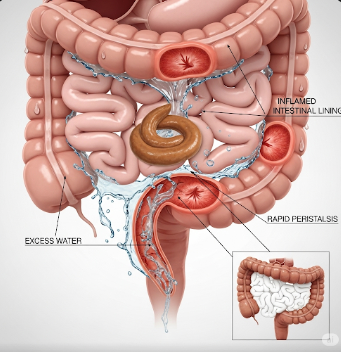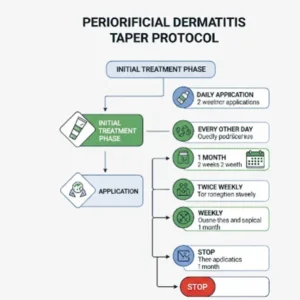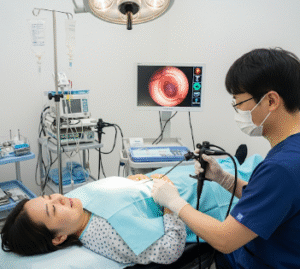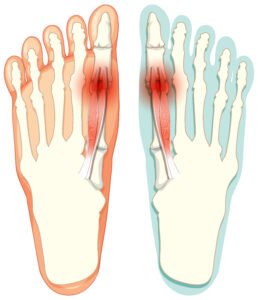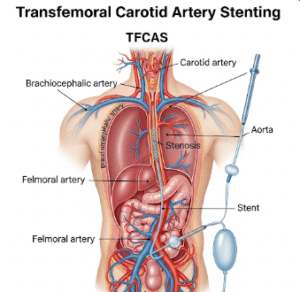Overview
Diarrhoea is a common digestive symptom characterized by frequent, loose, or watery stools. It can range from mild and self-limiting to severe and life-threatening, depending on the cause. In Korea, hospitals and gastroenterology clinics provide comprehensive diagnostics, treatment, and supportive care, helping patients manage diarrhoea effectively and prevent complications such as dehydration, nutrient deficiencies, or electrolyte imbalance.
Key Facts
▶ Prevalence: Affects people of all ages globally; more common in children, elderly, and immunocompromised individuals.
▶ Causes: Infections (bacterial, viral, parasitic), food intolerance, medications, gastrointestinal disorders, or stress.
▶ Associated Symptoms: Abdominal cramps, nausea, vomiting, fever, dehydration, or blood in stool.
▶ Treatment Options in Korea: Oral rehydration, medications, dietary management, and hospital-based care for severe cases.
▶ Urgency: Persistent, bloody, or high-volume diarrhoea requires immediate medical attention.
What is Diarrhoea?
Diarrhoea is defined as passing three or more loose or watery stools per day, often accompanied by an urgent need to defecate.
▶ Acute Diarrhoea: Sudden onset, usually lasting less than two weeks, often due to infection.
▶ Chronic Diarrhoea: Lasts more than four weeks, may indicate underlying gastrointestinal disorders.
▶ Secretory Diarrhoea: Caused by excessive fluid secretion in the intestines.
▶ Osmotic Diarrhoea: Results from malabsorption of certain foods or sugars.
▶ Inflammatory Diarrhoea: Occurs with infection, inflammatory bowel disease, or tissue damage.
Note: Understanding the type of diarrhoea is essential for effective treatment and prevention of complications.
What Symptoms Are Related to Diarrhoea?
▶ Frequent Loose or Watery Stools: Core symptom of diarrhoea.
▶ Abdominal Cramps or Pain: Often accompanies bowel movements.
▶ Nausea or Vomiting: May indicate infection or food poisoning.
▶ Fever: Suggests bacterial or viral infection.
▶ Blood or Mucus in Stool: Sign of infection, inflammation, or gastrointestinal disease.
▶ Dehydration Symptoms: Dry mouth, reduced urine, dizziness, or fatigue.
▶ Urgency or Incontinence: Difficulty controlling bowel movements.
▶ Weight Loss: Chronic diarrhoea can lead to nutrient loss and weight reduction.
What Causes / Possible Causes
Diarrhoea can result from infectious, dietary, medical, or chronic gastrointestinal causes:
▶ Infections: Bacteria (Salmonella, E. coli), viruses (norovirus, rotavirus), parasites (Giardia).
▶ Food Intolerance or Allergies: Lactose intolerance, gluten sensitivity, or specific food triggers.
▶ Medications: Antibiotics, antacids containing magnesium, chemotherapy drugs.
▶ Gastrointestinal Disorders: Irritable bowel syndrome (IBS), Crohn’s disease, ulcerative colitis, celiac disease.
▶ Surgery or Medical Conditions: Gallbladder removal, pancreatic insufficiency, or diabetes.
▶ Stress or Anxiety: Can trigger functional diarrhoea or worsen chronic conditions.
▶ Traveler’s Diarrhoea: Exposure to contaminated food or water during travel.
Note: Chronic or severe diarrhoea may indicate serious underlying medical conditions that require specialist evaluation.
When Should I See a Doctor?
▶ Persistent Diarrhoea: Lasting more than 2–3 days in adults or 24 hours in infants.
▶ Severe Dehydration: Signs include dry mouth, low urine output, dizziness, or rapid heartbeat.
▶ Blood or Mucus in Stool: Could indicate infection, inflammation, or gastrointestinal disease.
▶ High Fever: Above 38.5°C (101.3°F) accompanying diarrhoea.
▶ Severe Abdominal Pain: Suggests obstruction, infection, or inflammatory disease.
▶ Underlying Health Conditions: Chronic illnesses, immune compromise, or elderly patients.
▶ Rapid Weight Loss: Indicating malabsorption or chronic illness.
▶ Traveler’s Diarrhoea: Especially after visiting high-risk areas.
Tip: In Korea, gastroenterologists and hospitals provide rapid diagnostic tests, stool analysis, endoscopy, and targeted treatment for diarrhoea.
Care and Treatment
Management depends on cause, severity, and patient health:
▶ Hydration: Oral rehydration solutions (ORS) to prevent dehydration.
▶ Dietary Adjustments: Light, bland diet; avoid dairy, caffeine, fatty foods, and irritants.
▶ Medications: Anti-diarrhoeal agents (loperamide), antibiotics for bacterial infections, or antiparasitic drugs.
▶ Electrolyte Replacement: Especially in severe or chronic cases.
▶ Probiotics: To restore healthy gut flora and aid recovery.
▶ Monitoring: Observe stool frequency, fluid intake, and general condition.
▶ Hospitalization: Required for severe dehydration, blood loss, or chronic diarrhoea unresponsive to outpatient care.
Treatment Options in Korea
Medical Evaluation:
▶ Stool Analysis: To detect infection, blood, or inflammation.
▶ Blood Tests: Check for dehydration, electrolyte imbalance, infection, or anemia.
▶ Endoscopy: Colonoscopy or upper GI endoscopy for chronic or unexplained diarrhoea.
▶ Imaging: CT scan or abdominal ultrasound if structural problems are suspected.
▶ Specialist Consultation: Gastroenterologists assess chronic or severe cases.
Advanced Therapies:
▶ Targeted Medications: Antibiotics, antiparasitics, or anti-inflammatory drugs based on cause.
▶ IV Fluids and Electrolytes: For severe dehydration in hospital settings.
▶ Nutritional Support: Diet plans and supplementation for chronic diarrhoea or malnutrition.
▶ Multidisciplinary Care: Coordination among gastroenterologists, nutritionists, and infectious disease specialists.
Rehabilitation & Support:
▶ Patient Education: Guidance on hygiene, dietary habits, and preventing infections.
▶ Follow-Up Care: Monitoring for chronic or recurrent diarrhoea.
▶ Specialist Clinics: Korean hospitals provide integrated care for gastrointestinal disorders, infections, and chronic diarrhoea management.
Outcome: With early diagnosis and comprehensive treatment in Korea, diarrhoea can be managed effectively, preventing dehydration, improving gut health, and enhancing overall quality of life.

